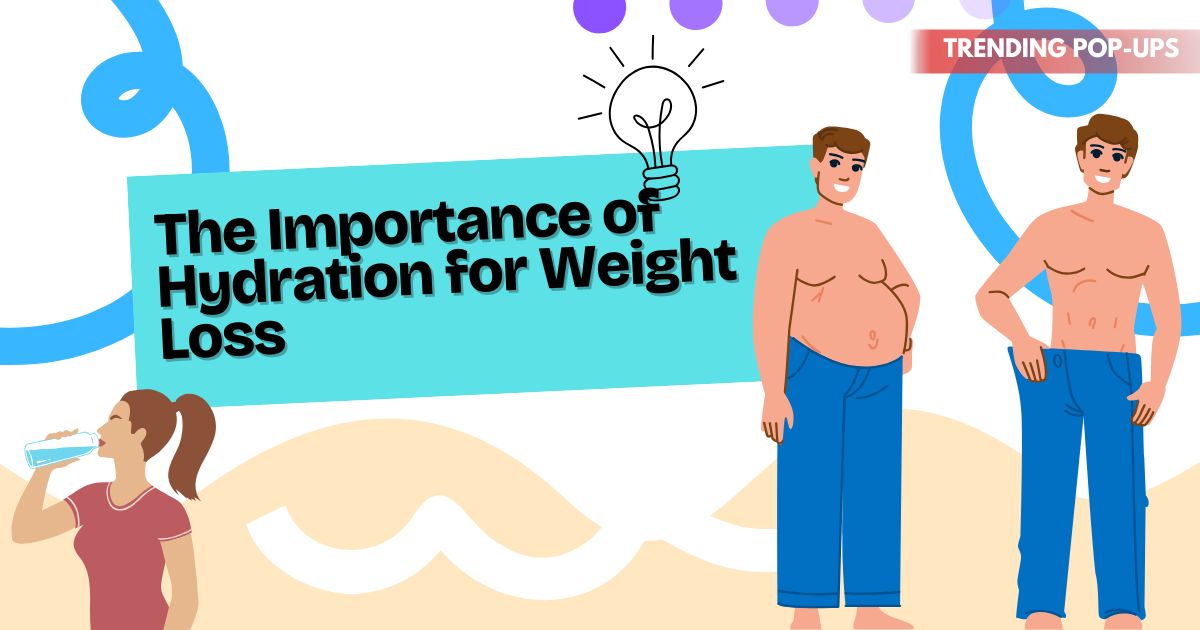When it comes to weight loss, people often focus on diet and exercise while overlooking one of the most crucial elements—hydration. Water plays a vital role in nearly every bodily function, from regulating temperature to aiding digestion. Beyond its general health benefits, proper hydration directly impacts weight management by influencing metabolism, appetite, energy levels, and fat-burning processes. Understanding the importance of hydration for weight loss can help you maximize results and achieve long-term success.
Why Hydration Matters in Weight Loss
Water is more than just a thirst quencher. It helps the body function efficiently, making it easier to lose weight. Staying hydrated supports key processes such as nutrient absorption, fat oxidation, and waste elimination. Without enough water, your body struggles to break down food, maintain energy, and burn calories effectively.
Water and Metabolism Boost
Metabolism is the process through which the body converts food into energy. Studies have shown that drinking water can temporarily boost metabolism by increasing thermogenesis—the production of heat in the body. For example, drinking around 500 ml of water can raise your metabolic rate by 10–30% for nearly an hour. This increase helps burn more calories, supporting gradual and sustainable weight loss.
Hydration Helps Control Appetite
Many people mistake thirst for hunger. As a result, they may eat extra calories when their body actually needs water. Drinking a glass of water before meals can help reduce calorie intake by making you feel fuller. Proper hydration improves satiety and prevents unnecessary snacking, which is often a major barrier to weight loss.
Water and Fat-Burning Process
Hydration is essential for lipolysis, the process of breaking down fat for energy. Without adequate water, the body cannot efficiently metabolize stored fat or carbohydrates. Simply put, dehydration slows down fat breakdown, making weight loss more difficult. Staying hydrated ensures your body can access and use fat as a fuel source effectively.
Hydration and Exercise Performance
Exercise is a key component of weight loss, but dehydration can impair performance. Even mild dehydration (as little as 2% of body weight) can reduce endurance, strength, and overall performance. This leads to shorter workouts and fewer calories burned. Drinking water before, during, and after exercise maintains stamina, prevents muscle cramps, and supports recovery.
The Role of Hydration in Digestion and Detoxification
Water is crucial for digestion and nutrient absorption. It helps break down food, supports nutrient transport, and prevents constipation. Hydration also aids in flushing out toxins and waste through urine and sweat, reducing bloating and water retention. A well-hydrated digestive system allows for smoother weight management and overall health improvement.
The Link Between Hydration and Reduced Calorie Intake
Choosing water over sugary drinks is one of the easiest ways to cut down on calories. Soft drinks, juices, and energy drinks are often loaded with sugar and empty calories that hinder weight loss. Replacing these with plain water or infused water helps reduce calorie intake without sacrificing hydration.
How Much Water Should You Drink for Weight Loss?
The ideal amount of water varies depending on age, weight, activity level, and climate. However, a general guideline is:
-
8–10 cups (2–2.5 liters) per day for average adults.
-
More if you are physically active or live in a hot climate.
-
A useful rule: drink half your body weight in ounces (e.g., if you weigh 160 lbs, aim for 80 ounces per day).
Listening to your body and drinking when thirsty is important, but being intentional about hydration ensures consistent support for weight loss.
Best Times to Drink Water for Weight Loss
Strategic timing of hydration can enhance weight loss:
-
Morning: A glass of water after waking up jumpstarts metabolism.
-
Before meals: Helps reduce overeating.
-
During exercise: Maintains stamina and performance.
-
Throughout the day: Keeps energy levels stable and prevents dehydration.
-
Before bed (in moderation): Prevents overnight dehydration without disrupting sleep.
Practical Tips to Stay Hydrated
-
Carry a reusable water bottle throughout the day.
-
Set reminders on your phone to drink water.
-
Flavor water with lemon, cucumber, or herbs for taste.
-
Eat water-rich foods such as cucumbers, melons, and oranges.
-
Track your water intake using apps or journals.
Making hydration a habit ensures you reap the weight loss benefits without much effort.
Common Myths About Hydration and Weight Loss
-
Myth 1: Drinking excess water melts fat instantly.
Reality: Water supports fat metabolism, but it doesn’t directly burn fat. -
Myth 2: Only plain water counts.
Reality: Herbal teas, infused water, and hydrating foods also contribute. -
Myth 3: Thirst is the only sign of dehydration.
Reality: Fatigue, headaches, and dry skin may also signal dehydration.
Conclusion
Hydration is a simple yet powerful tool in weight loss. It supports metabolism, reduces appetite, improves exercise performance, aids digestion, and helps the body burn fat effectively. By making water a daily priority, you not only improve your chances of losing weight but also enhance your overall health. The importance of hydration for weight loss cannot be overstated—it’s one of the easiest lifestyle changes with lasting impact.
Also Read : Easy Meal Prep Tips for Busy Individuals – Save Time & Eat Healthy
FAQs
1. Can drinking more water help me lose belly fat?
Water doesn’t directly target belly fat, but it helps reduce bloating and supports overall fat metabolism, which contributes to a slimmer waistline.
2. Is cold water better for weight loss?
Cold water may slightly increase calorie burn as the body warms it to body temperature, but the effect is minimal. The key is consistent hydration, regardless of temperature.
3. How can I tell if I’m drinking enough water?
A good indicator is the color of your urine. Pale yellow means you are well-hydrated, while dark yellow indicates dehydration.
4. Can I drink too much water while trying to lose weight?
Yes, excessive water intake can cause water intoxication or hyponatremia. Balance is important—drink according to your body’s needs.
5. Do coffee and tea count toward daily hydration?
Yes, but in moderation. Unsweetened tea and coffee contribute to hydration, though water should remain your primary source.



